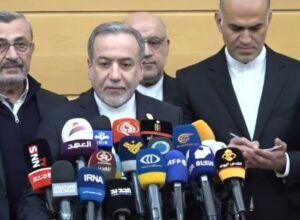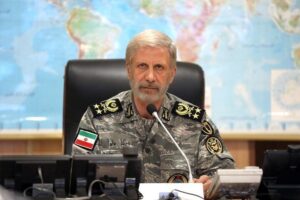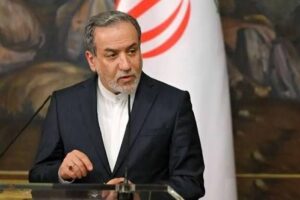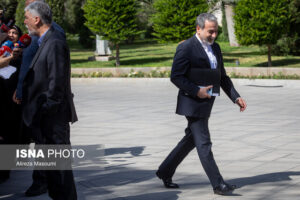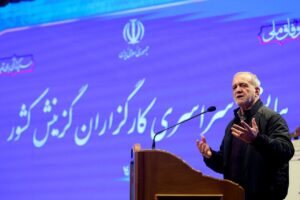Avash News: The founder and chairman of the Payab Think Tank added: “The lesson that the U.S. and the world must learn from twelve days of aggression and the sacred resistance of the Iranian people is that Iran will never bow down.”
Following is the full text of Dr. Zarif’s speech at the event:
It is a great pleasure to be with you this afternoon. I am happy that the 4th Conference of Iranian Studies has been a success, and I hope this trend will continue in the future. With your permission, I want to share with you some ideas about how we can proceed in the future, following the events, unfortunate as they may be, of last Spring.
Iran is standing tall
It is clear that in spite of the hardship that Iranian people suffered – because of the unprovoked aggression by Israel supported by the United States – that Iran is standing tall that neither Israel nor United States could achieve their ultimate objective. Israel, which is an illegal and illegitimate nuclear power, was unable to achieve the objective of its unprovoked aggression – while Iran was in the middle of conversations and discussions with the United States – even with the help and assistance of another nuclear power, and had to agree to a ceasefire, not suggested by Iran, but suggested by the other side. This is not about boasting about victory. We did not start the war, so talk of victory for Iran is irrelevant. The fact that those who started the war could not achieve their intended outcome indicates that the Iranian people were able to resist once again an aggression from outside. Our history is filled with cases of invasions, aggressions, and even occupations. But never in our history have we lost faith in our dignity and our ability as a nation to withstand such aggressions.
Israel committed war crime
Now let’s see where we are today. We have been able to continue. The country is in place. Many of our best commanders were illegally killed. You know that killing military commanders outside the battlefield is a war crime. And Israel committed that war crime in the hope of disabling Iran from responding. Within hours, we were able to bring ourselves together in spite of the shock and launched a defensive assault on Israel.
Two extremely important conclusions – very objectively – must be drawn by those who attacked:
One, Iranian nuclear capabilities are not destroyed. Because our capabilities were not our centrifuges or nuclear material. Our capabilities are our science, the technology, the know-how in the minds of Iranian scientists. They tried to kill the best of them. Many still exist. Science and technology cannot be eradicated. Even if they can destroy every single centrifuge. Every single gram of enriched uranium. They cannot destroy the scientific capability Iran has been able to achieve on its own: institutionalized and make it its own. It is not an imported science that can be exterminated by President Trump or the other aspirants. It is ours. And it will stay here.
And the conclusion from this is that it is in the best interest of the United States to think about how it can come to an agreement with Iran in order to make sure that this science and capability – that does exist in Iran and will remain in Iran – to remain peaceful. That is a much better strategic option. If I were to advise President Trump – I am under two sanctions in the United States so I am sure that President Trump won’t be seeking my advice. But in such impossible event, I would tell him that it is best to come to an agreement with Iran so that this technology remains peaceful and remain transparent rather than move underground.
Because Iranian people will never accept to be ordered as I said during the nuclear negotiation: “never threaten an Iranian”. Never try to humiliate Iranians. Iranians never surrendered. We were invaded. We were occupied. But we remained a nation – the longest existing nation on earth. And that will remain the case. We did not become Arabs. We don’t have anything against Arabs. But we did not become Arabs. We accepted Islam, but we kept our own civilization. Places to our east did not take that culture with it, just the teachings of Islam. With did not become occupied mentally by those who invaded us. In fact, they became Iranians. They took our colors and our culture.
So, if they think of being able to destroy our will, let alone “total surrender” – as somebody had the illusion of – but if they believed that they could break our will to follow our own path, they were badly mistaken. But they can come to terms with Iran in order to keep this peaceful and transparent. So, let’s put the illusion to rest.
Second, the second lesson we can take from this unprovoked and failed aggression – because an aggression, a war, is not calculated in terms of the number of people it killed, it is calculated in terms of result it achieved – it did not achieve in terms of result. Why? Because the Iranian people did not deliver what they expected them to deliver. They were badly mistaken about the nature of Iranian people. So Iranian people which remain our highest deterrence continue to be alive and very well capable of defending their country. Iranians are united and can defend themselves.
No one was immune from Iran’s missile in Israel
But more than that, Iran has the power and the will to inflict harm. I am not a war monger nor am I happy about people being killed. But the fact of the matter is Iran is the only country in this region that has been capable of inflicting damage across Israel. In Iran, 22 of our provinces never heard the sound of a bullet. I do not believe anybody in Israel was immune from the sound of our missiles. In 22 provinces, no one had to go to a shelter. I think in Iran, we do not have shelters to go to. I was in Tehran, and I stayed in my home and my office. But everybody in Israel had to stay in shelter for long hours.
Iran humiliated the United States
Let me share one point about the U.S. Some believe it is humiliating for Iran that the United States told Iran that you can attack any of our military bases in the region. But let me ask you to take this consideration: A superpower, a nuclear power spending 800 billion dollars a year on its war machine – it is no longer defense, it is called Department of war, as if we lived in 19th century. I think President Trump has forgotten the fact that in 1928, all CIVILIZED countries in the world decided to exclude war as a means of foreign policy. In the Briand Kellog Paris Pact of 1928. So it is about a century behind the civilization to rename the Department of Defense to Department of War. But a country that spends 800 billion dollars on war could not humiliate a country that spends less than 10 billion dollars on defense. But in fact, had to evacuate all personnel from all its bases surrounding Iran. And inform Iran in advance that you can hit anywhere you want. This is not humiliation for Iran; this is humiliating for the biggest nuclear power in the world, to even accept a situation where a middle power is allowed by that aggressor explicitly to attack its bases.
So, these two considerations:
Iranian nuclear technology cannot be destroyed. You have to deal with it; you have a come to terms with it; you have to find a negotiated settlement about this nuclear capability.
Two. Iran has the capability and the will to attack the US, and to attack Israel.
We can have a different future based on our possibilities
Now that is not a “wonderful situation” – to use the terminology that President Trump is used to. It is not beautiful; it is not something that you would try to invite upon yourself. So, can we have a better solution? Can we have a different future other than a repeat of our collective past mistakes? I am not saying that the US was the only side that made mistakes; we also made mistakes. But is there a different future? Can we think about a different future? I think the intelligence – not the ministry of intelligence – human intellect. I just saw some calling “artificial intelligence” “advanced intelligence”. Come on. Nothing is more advanced than human beings. Advanced intelligence? It’s a sorry state of affair that humans call a non-human intelligence as “advanced intelligence”. Intellectually speaking, we need to think about how to use our collective intellects in order to think about our past mistakes, to rid ourselves of those past mistakes, so that we won’t have to relive them again and again, as we have done in the past.
We need to move from a “default future” based on our past mistakes into a “generated future” based on our possibilities. And there are possibilities. I think we need to move away from a self-reinforcing threat paradigm into a self-reinforcing possibilities paradigm. A threat paradigm will not help anybody. It will not help our world; it will not help our nation; it will not help our region. We need to move forward to a “possibilities paradigm”.
Possibilities for the US, Iran
If we want to talk about possibilities; I talk about possibilities for the US: Possibilities for the US is to understand that Iran will not succumb, will not submit, and has the capability of its nuclear industry. And the possibility for them to come to terms with this country, accept this possibility, and to engage in a way that it will remain peaceful.
But for Iran, our possibilities are first our people. We need to accept that our people are not a threat, but our possibility. In that manner, we will treat our citizens as a possibility, we will treat the internet as a possibility, we will treat our women as a possibility, and we will treat our Generation Z as a possibility. We will treat everything in front of us as a possibility because these were the people that from the Leader to every military commander, everybody admitted that what defeated Israel was the Iranian people. Our missiles are very important. I am not trying to create a dichotomy. Our missiles are important, extremely important, but the people were the ones who destroyed the Israeli illusions. So, we need to use, enhance, and augment this possibility. We have to first recognize it as a possibility before we van enhance it.
We need to move from a threat paradigm into a possibilities paradigm
Second, we need to move from a threat paradigm into a possibilities paradigm. But it does not mean that we have to forget about threats. We need to bolster our defenses. We continue to spend much less than anybody else in this region on defense. We need to try to invest more. Of course, we need to have more money in order to invest more so we need to develop the possibilities for gaining, getting more currency in order to spend on our military within limits. And I think those limits must be regional, not just for Iran. I think the United States, instead of bragging about sending, as the President Trump called it, “beautiful military equipment” to the region, must stop sending these instruments of mass murder into our region. And think about development. So, we need to bolster our possibilities in the defense industry. Boost our people as our most important possibility and boost our defense as the second important possibility. Boost our people, boost our defense.
We must boost our regional relation
Third, boost our relations with the region. I think our region is our possibility. We should not see the region from a threat perspective. Of course, we have a lot of grievances about countries in our region. Our Arab neighbors supported Saddam Hussein for eight years. So, if anybody is there to complain, it’s us, not them. Let’s be clear about this. But we should not be prisoners of the past. We need to have good relations with all our neighbors.
We had differences with Russia in the Past. Russia is an important neighbor. Any phobia about the West or the East is dangerous. We should fight phobias. Russo-phoebes are as dangerous as Euro-phoebes. But Russophiles are as dangerous as Americophiles. We are Iranians. We don’t need to be “…phoebes” or “philes” of anybody. We are Iranophiles.
We need to have good relations with our neighbors. And those relations must be forward-looking, not backward. So, complaints and grievances about the past will guide us in the future, but should not imprison us. As Nelson Mandela said, we will not forget the past, but we will move from the past. We will not get stagnated in the past because that will prevent us from seeing possibilities in the future. We have grievances about our region. But that does not mean we should not aim for quality relations with our neighbors based on principles of non-interference, of respect for sovereignty, respect for territorial integrity, and cooperation in this region.
I suggested – with a colleague of mine – a network for nuclear cooperation. Now that suggestion has been echoed by Ernest Moniz, who used to be the counterpart of my friend Dr. Salehi during our nuclear negotiations. The Secretary of Energy of the United States and a MIT professor. So, if somebody accuses me of being an idealist, I don’t think anybody would consider Moniz to be an idealist. The man who oversaw American nuclear weapons. He is suggesting a regional approach to nuclear technology in our region. Also, I think we need to think about the Muslim West Asia dialogue Association, “MWADA” – amity. We have to change enmity to amity. We have not gained anything from enmity. There is much to come from amity. So MWADA or Muslim West Asia Dialogue Association should be a future possibility. We have to remove the past barriers from our eyes. And see again.
As Sohrab Sepehri said. We must wash our eyes. We should see differently. Our eyes are clouded with our pasts. Let’s get rid of them. Our region is our future. And we need to build on that and building on that would be based on seeing possibilities not threats.
We must engage with the world
Last but not least. We need to engage with the world. We are now assured of ourselves. After two hundred and twenty years of being humiliated by the outside world, the Islamic Republic has been able to show that, whatever the cost, and I am not here to justify the cost, no, it could have been much less expensive, in terms of human lives and in terms of financial resources. But let’s not get stuck in the prison of the past, because even if we do, it won’t recover the losses. The losses are the losses. We need to move in order to make progress. So, we need to stand on our achievements. The leader said the era of “hit and run” is over.
Iran has shown that even if the United States wants to hit, it must accept to receive a response. It must pay the bill. Use that not as a prison but as a staging ground, as a jumping board, to engage the international community in comprehensive negotiations in order to prevent further miscalculation. We know that the US miscalculated. But that miscalculation cost us too. Some of our best military commanders, some of our best scientists, we have nothing to gain from the US repeating that mistake. So, we have to prevent it by being self-confident, by knowing that we can have our word. By knowing that in any negotiations, they will not be able to dictate to us. We have shown it in the past; we will be able to show it in the future.
Iran will not come to its knees
So, the 4th way to see the future, rather than being imprisoned by the past, is to be confident in our capability, and of the support of our people, to engage in the international community. We know that they do not have good intentions. But we want to prevent any harm coming from them and want them not to harm themselves. Not to be in the prison of their self-illusions.
So, we can move forward, and I believe this is a lesson that we can learn from the 12-day aggression and sacred resistance of the Iranian people.
This is the lesson that the US and the rest of the world must learn from those 12 days: that Iran will not come to its knees.
Thank you very much.

